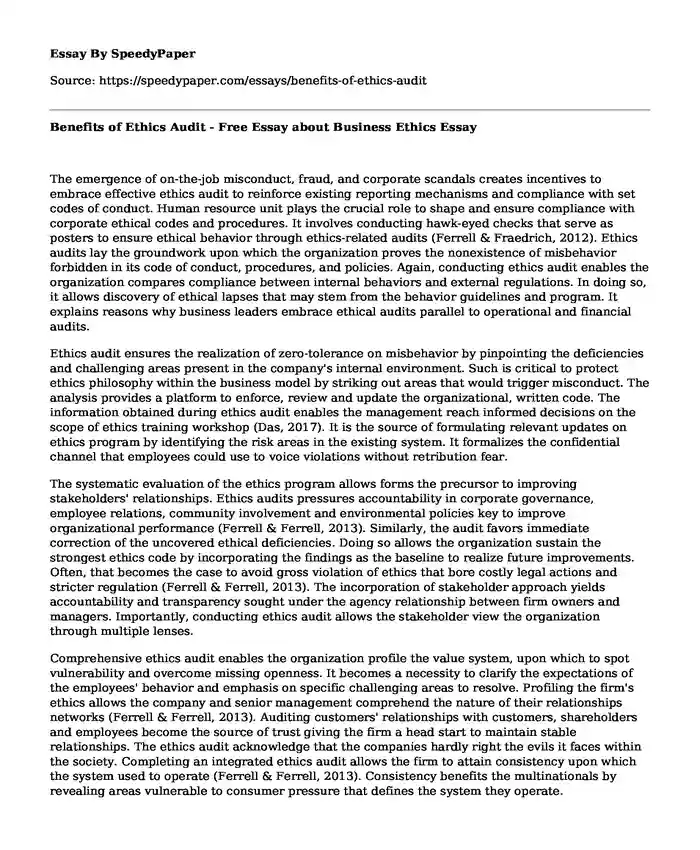
| Type of paper: | Essay |
| Categories: | Business ethics |
| Pages: | 3 |
| Wordcount: | 637 words |
The emergence of on-the-job misconduct, fraud, and corporate scandals creates incentives to embrace effective ethics audit to reinforce existing reporting mechanisms and compliance with set codes of conduct. Human resource unit plays the crucial role to shape and ensure compliance with corporate ethical codes and procedures. It involves conducting hawk-eyed checks that serve as posters to ensure ethical behavior through ethics-related audits (Ferrell & Fraedrich, 2012). Ethics audits lay the groundwork upon which the organization proves the nonexistence of misbehavior forbidden in its code of conduct, procedures, and policies. Again, conducting ethics audit enables the organization compares compliance between internal behaviors and external regulations. In doing so, it allows discovery of ethical lapses that may stem from the behavior guidelines and program. It explains reasons why business leaders embrace ethical audits parallel to operational and financial audits.
Ethics audit ensures the realization of zero-tolerance on misbehavior by pinpointing the deficiencies and challenging areas present in the company's internal environment. Such is critical to protect ethics philosophy within the business model by striking out areas that would trigger misconduct. The analysis provides a platform to enforce, review and update the organizational, written code. The information obtained during ethics audit enables the management reach informed decisions on the scope of ethics training workshop (Das, 2017). It is the source of formulating relevant updates on ethics program by identifying the risk areas in the existing system. It formalizes the confidential channel that employees could use to voice violations without retribution fear.
The systematic evaluation of the ethics program allows forms the precursor to improving stakeholders' relationships. Ethics audits pressures accountability in corporate governance, employee relations, community involvement and environmental policies key to improve organizational performance (Ferrell & Ferrell, 2013). Similarly, the audit favors immediate correction of the uncovered ethical deficiencies. Doing so allows the organization sustain the strongest ethics code by incorporating the findings as the baseline to realize future improvements. Often, that becomes the case to avoid gross violation of ethics that bore costly legal actions and stricter regulation (Ferrell & Ferrell, 2013). The incorporation of stakeholder approach yields accountability and transparency sought under the agency relationship between firm owners and managers. Importantly, conducting ethics audit allows the stakeholder view the organization through multiple lenses.
Comprehensive ethics audit enables the organization profile the value system, upon which to spot vulnerability and overcome missing openness. It becomes a necessity to clarify the expectations of the employees' behavior and emphasis on specific challenging areas to resolve. Profiling the firm's ethics allows the company and senior management comprehend the nature of their relationships networks (Ferrell & Ferrell, 2013). Auditing customers' relationships with customers, shareholders and employees become the source of trust giving the firm a head start to maintain stable relationships. The ethics audit acknowledge that the companies hardly right the evils it faces within the society. Completing an integrated ethics audit allows the firm to attain consistency upon which the system used to operate (Ferrell & Ferrell, 2013). Consistency benefits the multinationals by revealing areas vulnerable to consumer pressure that defines the system they operate.
Findings derived from ethics audit provides a revealing snapshot source of strong values and vulnerabilities. It becomes the source of factual ground to resolve moral failure and reinforce fraud resistance within the organization ranks. Ethics audit allows the discovery of gaps in organization policies, thus enabling the organization resolve lapses that would erode its reputation during fraud incidences. Ethics audit become the source of differentiation that enables the organization to realize substantial compliance between internal and external controls while adhering to legal regulations.
References
Das, A. ( 2017). Managing Business Ethics & Compliance. New Delhi: Educreation Publishing.
Ferrell, O. C., & Ferrell, J. F. (2013). Business Ethics: Ethical Decision Making & Cases. Mason, OH : Cengage Learning.
Ferrell, O. C., & Fraedrich, . (2012). Business Ethics: Ethical Decision Making & Cases (9 ed.). Boston : Houghton Mifflin Co: South-Western.
Cite this page
Benefits of Ethics Audit - Free Essay about Business Ethics. (2022, Apr 12). Retrieved from https://speedypaper.net/essays/benefits-of-ethics-audit
Request Removal
If you are the original author of this essay and no longer wish to have it published on the SpeedyPaper website, please click below to request its removal:
- Free Essay with The Movie Analysis, You Don't Know Jack
- Healthcare Essay Sample: Milieu and CAM Therapy
- Essay Sample Describing the Case Study of Vauban: Car-Free Suburb
- Rhetorical Essay on Graphic Novel, "Superman Red Son"
- Free Essay Example: Samsung as the Global Company
- Essay Sample on Power and Usefulness of Political Frame in Navigating an Educational Organization
- Free Essay: Effects of Transformational Leadership on Nursing
Popular categories




